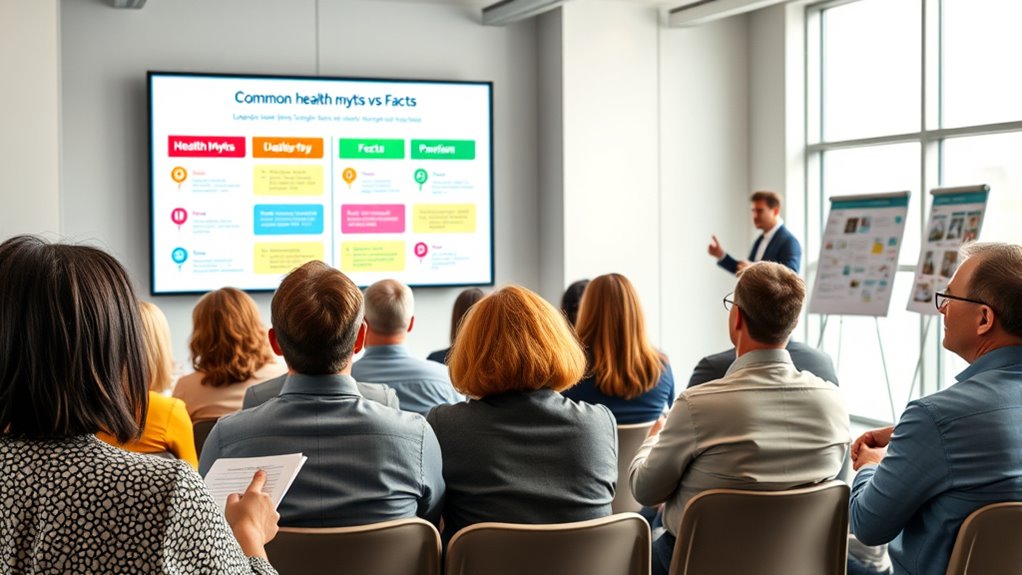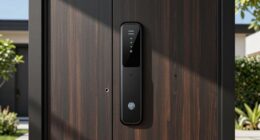To understand common health myths and facts, it’s important to critically examine what you hear and see online. Many false claims persist because they’re repeated often or sound convincing. Focus on reputable sources, like health organizations and studies, to verify truths. Be cautious of exaggerated promises or immediate results. Staying curious and questioning health advice helps you make smarter choices. If you keep exploring, you’ll uncover ways to tell fact from fiction and stay healthier.
Key Takeaways
- Verify health claims with reputable sources like peer-reviewed studies or trusted health organizations.
- Recognize exaggerated claims and promises of instant results as potential myths.
- Understand that hydration is important but overhydration can be harmful; water doesn’t detoxify alone.
- Critical thinking and fact checking help distinguish scientifically supported facts from misinformation.
- Continuous education and digital vigilance are essential to navigate and identify credible health information.

Many health myths persist because they’re repeated so often that people accept them as facts. It’s easy to fall into this trap, especially when misinformation circulates widely online or through word of mouth. That’s why myth busting and fact checking are essential tools in your quest to understand what’s truly healthy. Instead of blindly trusting popular beliefs, you can take a proactive approach to uncover the truth behind common health claims. When you hear something that sounds too good to be true or simply doesn’t make sense, pause and ask yourself: is this backed by scientific evidence?
Question claims critically and seek scientific evidence to uncover health truths.
The process of myth busting involves critically examining the claims you encounter. For example, many people believe that drinking large amounts of water can flush out toxins completely. While staying hydrated is important, overhydration can be dangerous and won’t necessarily eliminate toxins faster. By fact checking this claim, you realize that your body’s liver and kidneys do the real work of detoxing, not water alone. This knowledge helps you make smarter choices and avoid unnecessary or harmful behaviors.
Healthy skepticism is a key part of understanding health information. When you come across a new health trend or advice, don’t accept it at face value. Instead, look for reputable sources like peer-reviewed studies, health organization websites, or expert opinions. Many myths are perpetuated because people don’t take the time to verify facts. Your role in this process is to question, explore, and verify. Whether it’s claims about weight loss, supplements, or exercise routines, fact checking helps you avoid falling for exaggerated promises or misleading marketing.
It’s also helpful to recognize common signs of misinformation. If a health claim sounds overly dramatic or promises instant results, it’s likely suspect. Remember, healthy habits take time, and there are no miracle cures. When you do your own myth busting, you empower yourself with accurate information, which allows you to make better health decisions. It’s about building a solid foundation of knowledge rather than relying on myths that may be outdated or false.
In today’s digital age, it’s more important than ever to be vigilant about the information you consume. The internet is full of health advice, but not all of it is credible. Fact checking and ongoing education help you cut through the noise and focus on what truly benefits your health. For example, understanding the role of contrast ratio in projectors can help you better evaluate visual equipment, similar to how verifying scientific claims clarifies health information. By staying curious, questioning claims, and verifying facts, you take control of your well-being and avoid falling prey to common health misconceptions. Remember, knowledge is power — and in health, that power can lead to a happier, healthier life.

Drone with EIS 4K Camera for Adults, GPS Drone with 5.0" Screen on Controller, 70 Mins Flight, Long Range Transmission, AI Track&Orbit Mode, Follow Me, Auto Return, Lightweight and Foldable RC Drones for Beginner Toy Gifts, Under 249g
【Drone with Screen on Controller】Instant FPV with 5.0” Display – No Phone Needed: Experience truly immersive flying with...
As an affiliate, we earn on qualifying purchases.
Frequently Asked Questions
Are Detox Diets Effective for Cleaning the Body?
You might wonder if detox diets effectively clean your body. While many detox myths claim they do, your liver and kidneys naturally detoxify and keep you healthy. Detox diets often lead to temporary weight loss but don’t provide long-term body cleansing benefits. Instead of relying on these myths, focus on balanced nutrition, hydration, and regular exercise to support your body’s natural detox processes effectively.
Can Eating Carrots Significantly Improve Night Vision?
Eating carrots can help improve night vision because they are rich in vitamin A, which is essential for eye health. While eating carrots won’t give you superhuman night vision, a diet high in vitamin A supports proper eye function. So, including carrots in your meals may slightly enhance your ability to see in low light, but don’t expect dramatic changes—it’s all about maintaining overall eye health.
Is Organic Food Always Healthier Than Non-Organic Options?
Think organic food is always healthier? Not necessarily. While organic farming reduces pesticide use, it doesn’t guarantee more nutrients. Sometimes non-organic options are just as nutritious, and prices can be higher for organic foods. It’s important to look at labels and choose a balanced diet. Organic farming focuses on sustainability, but health benefits depend on overall diet and lifestyle, not just whether food is labeled organic.
Does Drinking Warm Lemon Water Cure Colds?
Drinking warm lemon water doesn’t cure colds, but it can support your immune boosting efforts and offer hydration benefits. The vitamin C in lemons may help strengthen your immune system, and the warm temperature can soothe a sore throat. While it won’t eliminate the cold, staying hydrated with lemon water can keep you comfortable and aid your body’s natural recovery process. Remember, rest and proper nutrition are key too.
Are Sugar-Free Products Completely Safe for Diabetics?
Think of sugar substitutes as a double-edged sword. While they help keep blood sugar levels steady, some may cause digestive issues or cravings. For diabetics, these products aren’t completely safe; they can still impact blood sugar, especially if consumed excessively. Like walking a tightrope, you need to balance them carefully. Always check labels and consult your doctor before making sugar-free products part of your routine.

Drone with 1080P Camera, Foldable Drone for Beginners with Light, Upgrade Altitude Hold, Gesture Selfie, Waypoint Fly, 3D Flip, 3 Speed Mode, Circle Fly, One Key Start
COOL DRONE FOR BEGINNERS: JY02 Drone is an ideal choice for beginners to start their first drone flying...
As an affiliate, we earn on qualifying purchases.
Conclusion
Think of your health journey as charting a vast ocean. The myths are like misleading currents, trying to steer you off course, while facts are your steady compass guiding you true. By understanding what’s real and what’s false, you stay on course toward wellness. Trust your compass—knowledge—and steer clear of falsehoods. When you do, your voyage becomes smoother, and reaching your health goals becomes a confident, fulfilling adventure.

Drone with Camera - Drone with Screen on Controller for Beginners, Foldable Remote Control Quadcopter with Gesture Control, 3D Flip, One Key Start, Emergency Stop, 2 Batteries, Easier to use to use
The PK01 drone's remote comes with a super handy built-in screen—no phone needed—so you can watch live HD...
As an affiliate, we earn on qualifying purchases.

Drone with Camera 1080P HD FPV Foldable Mini Drone for Beginners Kids Adults, Drone with One Key Take Off/Landing, Gesture Selfie, Altitude Hold, 3D Flip, Easy to Fly, 2 Batteries, Toys for Boys Girls
【Easy to Fly: Master the Sky Instantly】 No experience? No problem! Equipped with One-Key Takeoff/Landing and Altitude Hold,...
As an affiliate, we earn on qualifying purchases.










